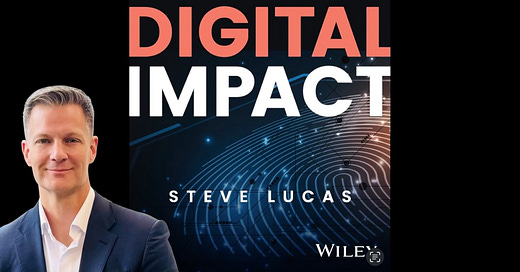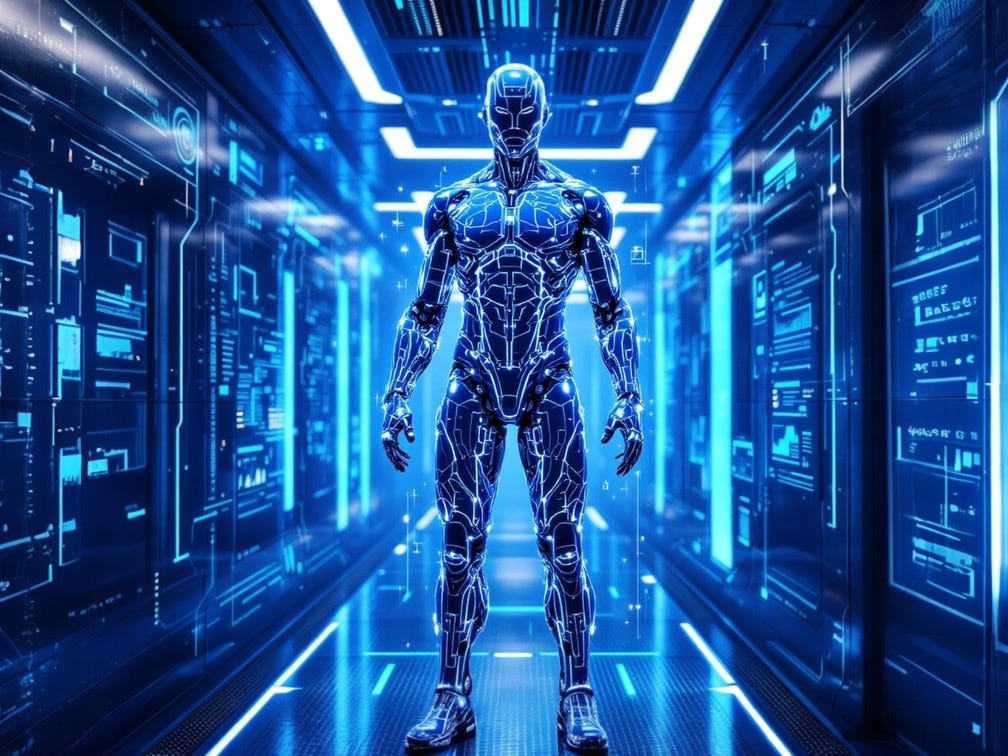By Diamond Michael Scott
Let’s be honest: The AI revolution feels like it’s barreling toward us like a runaway freight train. Dazzling promises. Terrifying risks. Endless hype. And yet, beneath the noise a quiet but powerful idea is taking shape: What if technology isn’t the star of the show? What if humans still matter?
That’s the heart of Digital Impact: The Human Element of AI-Driven Transformation by Steve Lucas, CEO of Boomi and one of the clearest voices in today’s AI conversation. Steve doesn’t sugarcoat where we are: “We’ve created utter chaos and fragmentation,” he tells me. “For 30 years, companies kept buying software with the same promise: ‘If you just buy this one thing, your life will be better.’ But that’s never really happened, has it?”
No, it hasn’t. Instead, we’ve ended up with a tech landscape littered with disconnected systems, scattered data, and leaders hoping the latest AI magic wand will finally make sense of it all. Steve calls it out for what it is: fantasy.
But here’s where Digital Impact becomes more than just another tech book. It’s a call to rebuild the foundation — to integrate the fractured systems beneath the glittering AI surface, so that human-centered outcomes actually become possible.
Fixing the Foundation: Where Real Impact Begins
The Dave Alexander Center for Social Capital was practically built for this conversation. Our mission has always been clear: Business is about people. Profit is important, yes, but people are the point. And in Steve’s view, the only way AI can serve people is if organizations finally solve their chronic digital fragmentation.
“Agentic AI is an engine,” Steve says. “But data is the fuel. If you don’t fix your systems so that accurate, trusted data flows, you’re just feeding the AI garbage. And you know the old rule: garbage in, garbage out.”
In other words: AI doesn’t absolve you from doing the hard work. It exposes whether or not you’ve done it.
This philosophy echoes the core values of Social Capital: Real success comes from investing in the infrastructure that allows people — employees, customers, communities — to thrive. Technology isn’t the destination. It’s a servant. And right now, most organizations have far too many servants pulling in opposing directions.
The AI Boom: Opportunity Meets Responsibility
Steve’s no cynic, though. In fact, he’s wildly optimistic about the potential of AI to create human flourishing. “We’re living in an incredible moment where science fiction is becoming just science,” he says. “New medicines, longer lives — this is the biggest transformation humankind has ever seen.”
But then he drops one of the most powerful lines of our entire conversation, quoting Jeff Goldblum’s iconic line from Jurassic Park: “Your scientists were so preoccupied with whether they could, they didn’t stop to think if they should.”
That’s the ethical tightrope we’re walking. The toothpaste is out of the tube, as Steve puts it. AI is here. But whether it helps or harms depends entirely on whether we keep “humans in the loop.”
At the Dave Alexander Center, we call this moral accountability. It’s not enough to innovate; we must also elevate. If AI gives us superhuman capabilities, it demands superhuman responsibility. And Steve believes governance will be the ultimate dividing line between AI’s winners and losers.
“If you have thousands — or millions — of autonomous agents making decisions on behalf of your company, who’s watching them? Who’s governing them?” Steve asks. “Change only happens at the speed of trust.”
Social Capital rests on the exact same principle. Trust is not a byproduct, it’s the operating system. Without it, no amount of digital wizardry will save your business.
Real Stories. Real People. Real Impact.
What makes Digital Impact more than theory is the humanity pulsing through its pages. Steve doesn’t just throw around abstract ideas — he grounds them in real-world stories that perfectly align with the Center’s vision for people-centric capitalism.
Take Tony’s Chocolonely, fighting to end child labor in West Africa by using technology to track cocoa supply chains with unprecedented transparency. Or the Credit Union of Colorado, using integrated systems to proactively support members during financial hardship. Or the American Cancer Society, or the Australian Red Cross, two organizations where backend digital transformation is literally saving lives.
“Technologists aren’t excited about connecting Salesforce to NetSuite,” Steve laughs. “They’re excited about making a difference for people.”
At the Dave Alexander Center, we believe this is what business leadership looks like in the 21st century: CEOs who understand that their real product is human thriving. Technology is simply the mechanism by which they serve.
Avoiding the Blockbuster Trap
Of course, there’s a dark side to this story too — and Steve doesn’t flinch from it. “There will be thousands of Blockbusters,” he warns, referencing the once-great video rental giant that collapsed by failing to adapt to digital disruption.
In today’s agentic AI revolution, leaders who bury their heads in the sand will suffer the same fate. “Every CEO I know is now saying, ‘If new software doesn’t have AI that helps our people do their jobs better, we’re not buying it,’” Steve says. “‘And we’re not waiting.’”
For leaders, the mandate is simple: Lean in. Learn fast. Make AI serve humans, not the other way around.
The New Capitalism: Human-Centered, AI-Powered
In the end, Digital Impact is a blueprint not just for AI transformation but for the next stage of capitalism itself — a vision deeply aligned with the Dave Alexander Center’s mission.
Social Capital isn’t a nice-to-have. It’s the new ultimate asset. And Steve’s message is clear: as technology grows more powerful, so too must our commitment to people, ethics and purpose.
AI may change how we work. But it’s up to us to decide why we work.






